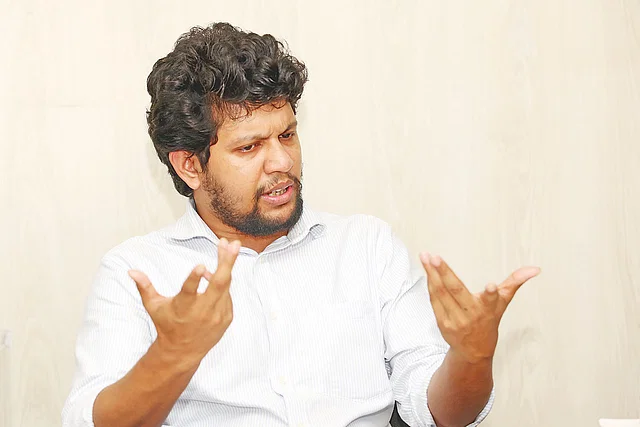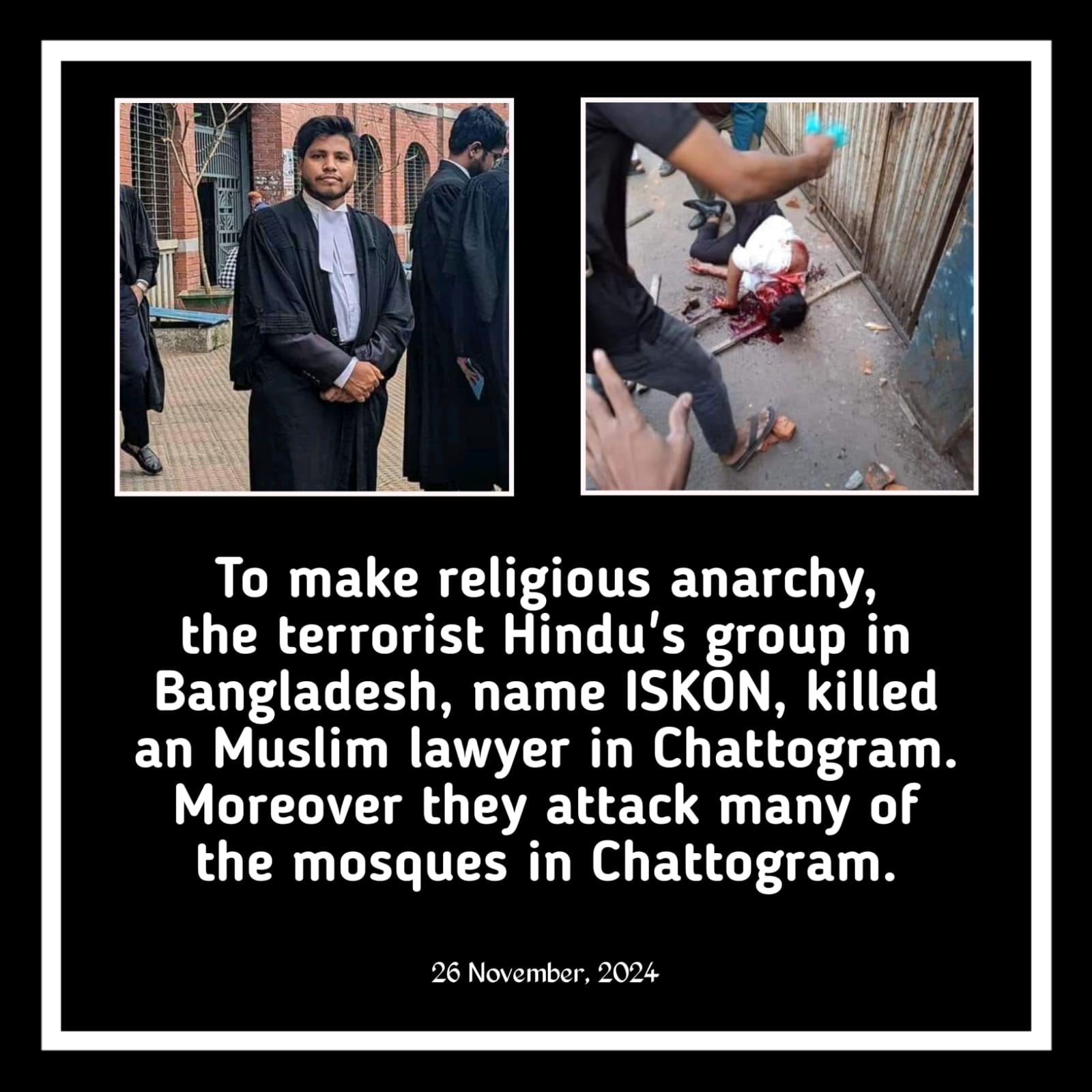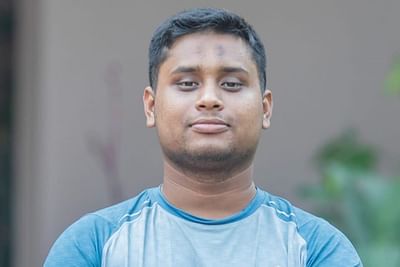Part 2
“Mahfuz Alam is the Special Assistant to the Chief Adviser of the interim government formed after the student-popular uprising. He was the coordinator of the liaison committee established to maintain communication between students, citizens, and the interim government after the uprising. A graduate in law from Dhaka University, he played the role of a political-intellectual collaborator in the movement. Prothom Alo’s Executive Editor, Sajjad Sharif, interviewed him regarding the thoughts of the students on the movement and the social and political transformation. The first part of this two-part interview was published, Wednesday. The final part has been published today.”
Prothom Alo: We are now hearing voices from various Islamist groups. How do you see this?
Mahfuz Alam: The different Islamist ideologies in Bangladesh have grown resentful because there hasn’t been any dialogue with them for the past 50 years. This resentment makes people reactionary. When someone feels like they’re backed into a corner, what else can they do?
A large portion of our ruling class identified as secular, but they were never truly within a secular framework. How does a poor boy in society grow up? The state doesn’t feed him, the orphanage does.
The state has never paid attention to them. As a result, they’ve carved out their own path. Now many people lament, asking why Bengali culture didn’t take root. Well, it didn’t because you never engaged in dialogue with those in the villages or small towns.
You took figures like Lalon and Hasan Raja from society and placed them within the state structure. But Lalon or Hasan became iconic through social interaction and engagement.
The rural people see Dhaka city as the representation of the state. They’ve understood that no one is going to give them anything. So, they’ve created their own systems and their own political culture. When someone shows up there in modern clothes, they are met with suspicion and hostility. Why? Because rural people have drawn their own boundaries—what you can do in Dhaka, you can’t do here.
One thing many people don’t know is that after the Shapla Chattar incident, many madrasa students lost their access to food. The Awami League made sure that no one could provide money to them.
Prothom Alo: The mazar (shrines) are institutions for poor Muslims. Who demolished them?
Mahfuz Alam: I have visited many mazars and have a deep love for the pirs and auliyas (Sufi saints). Historically, they are significant. Sufi saints played an extraordinary role in spreading Islam in Bengal and in shaping the historical community of Bengali Muslims.
At the same time, it’s also true that for the past 15 years, the Islamic Foundation has been run by people who follow Sufism. A large portion of these individuals supported the Awami League. So, the incidents of shrine demolitions have a political vendetta behind them. Religion just happens to be the visible element here.
For instance, if Lalon is used to support fascism, Lalon himself isn’t to blame. The cultural-political symbols of fascism have been broken down—that’s one perspective. However, personally, I am against destroying anything.
Prothom Alo: Among the religious groups, there are divisions ranging from conservative to liberal. Who holds more power among them? Some are even talking about establishing a caliphate.
Mahfuz Alam: The idea of a caliphate in Bangladesh was first introduced by Hafizzi Huzur. His party was even named the Khelafat Andolon (Caliphate Movement). He had an interesting political concept known as “the politics of repentance” (tawba). This meant that the past political mistakes must be repented for, and Bangladesh as a state should be built from that repentance. This terminology is rooted in political theology, but their politics still operated within the framework of democratic electoral politics.
Many are now discussing the demand for establishing a caliphate. Even Jamaat-e-Islami seeks a caliphate, but the question is: how? It’s important to understand that in the present era, the state has become such an oppressive institution that it doesn’t align with any religion.
Prothom Alo: Religion is a deeply personal and intellectual matter for a thoughtful individual. Yet, the state is an institution. An institution can’t adopt a religion for itself. In that case, my question is: where should the connection between Islam and people take place?
Mahfuz Alam: Society, culture, customs, and practices are the spheres where religion operates. The only thing that can come from religion into the state is morality. However, Islam is a unique religion because it has a political proposition. It doesn’t just have a hypothesis, it also has a prototype—for example, the thirty years of the Caliphate.
Even if we don’t consider the full thirty years, we can focus solely on the thirteen years of the Prophet’s (PBUH) time in Medina. Since there is a prototype, the dream of it will continue to inspire Muslims until the Day of Judgment.
But if the state tries to accommodate Islam, then Islam itself will become something limited and oppressive. The idea of the Islamic Ummah is universal. It doesn’t fit within the framework of the nation-state. In the structure of the current nation-states, the implementation of Islam or Shariah is impossible. That’s why scholars have argued that Shariah is not the primary concern; what is important are the Maqasid al-Shariah (objectives of Shariah), the core of which is the protection of life and property. This leads to a focus on basic human rights. The resolution must be found here.
If the question of enforcing full Shariah arises, neither Shariah will be fully realized, nor will the state. The state would fall into a suspended, conflicted state, and Muslims here would be in an even worse condition. The scholars need to understand this. The issue of religion within the state should be resolved.
Prothom Alo: In the state framework you are proposing, what will be the position of members of religious or ethnic minority groups?
Mahfuz Alam: In that framework, as citizens, everyone must have equal shares. The fundamental civic rights from the perspective of the state must be the same for a Muslim as they are for an Ahmadi, Hindu, Buddhist, Chakma, skeptic, or non-believer. There can be no discriminatory clauses regarding the morality of the state. This is my observation. In our student power proposal, there was one point, and it still exists. That is, the state will not interfere in the social and cultural expressions of each community.
Prothom Alo: I see the mention of history in your various statements. How do you view the periods of 1947, 1971, and 2024 in history?
Mahfuz Alam: From the Sepoy Rebellion in 1857 to 1947, the Bengali Muslim community fought various battles and attempted to resolve various issues—related to language, culture, and society—for a hundred years. There were questions about how to view music, drama, dance, and women as well. Before Begum Rokeya, a person named Mirza Delwar Hossain argued from Islam that the liberation of women was necessary. He was labeled an atheist because he wrote under the pseudonym Mutazila.
For these reasons, I see 1947 as a point of economic, social, and religious liberation for Bengali Muslims. Many people view it from a Marxist perspective as a path for the economic liberation of a poor region. Muslim nationalists argue that it was done for Islam. There can be many interpretations.
I also see 1947 as a friendship between Bengali Muslims and lower-caste Hindus. This friendship is not religious but emerges from the place of oppression and persecution faced by lower-caste Hindus in connection with the Muslim community by name and identity.
Unfortunately, the possibility of this friendship was disrupted in the riots of 1950. Jogen Mandal moved to Kolkata. This is another important dividing line in our history.
The events of 1971 stemmed from two understandings of the Bengali Muslim community. Until 1947, their understanding of Islam had changed. They began to realize that the Islam of Bengal did not align with that of Pakistan, nor even with that of North India. Consequently, they stood against Pakistani Islam.
To understand this, I find historians like ABM Habibullah or Abdul Karim significant. They have articulated the narrative that we are neither Indian nor Pakistani. The Muslim population here has a distinct characteristic, with a unique historical and cultural form of Islam. This population has a historical struggle that the Pakistanis do not support.
In the great Liberation War, their struggle was not only for freedom from the Pakistanis but also from India. The blame for the two-nation theory is always placed on Pakistan; however, it becomes clear from the posthumous additions to Maulana Abul Kalam Azad’s book what India wanted and what Nehru and Patel did.
However, the aspirations of the Liberation War for people’s freedom were not merely for any religious community. I just want to say that we need to understand why oppressed Bengali Muslims played such a significant role in this historical struggle for liberation.
Prothom Alo: You have mentioned that 1971 and 1972 are not the same. Could you elaborate on that?
Mahfuz Alam: The issues of the Liberation War in 1971 were suppressed under the weight of the stone in 1972. In 1972, the national resolution was made linear. There was no space left to include the larger Bengali Muslim society within the so-called framework of secularism. As a result, many opportunities for politics based on Islam were created. The farmers and workers were also excluded from the state.
Another ruling class, similar to the ruling class of Pakistan, took control. Institutions were destroyed in the name of nationalization. The state’s resources were handed over to the Awami League. In this way, the state was gradually dismantled.
The rise and expansion of capitalism and the shift and distribution of wealth in Bangladesh have created a massive crisis. Why did a bourgeois society not develop in Bangladesh? Why do we not have a national bourgeoisie that thinks about the state or the nation? Since 1972, that ideological trap has been set.
Prothom Alo: What is the connection between the Liberation War of 1971 and the student movement of 2024?
Mahfuz Alam: The uprising of 2024 presents a new opportunity to reconsider the aspirations that emerged during the Liberation War of 1971. We have the chance to realize the desires behind the struggles of our ancestors and the sacrifices of millions of martyrs. Political parties, especially Mujibism, have trampled on the aspirations of 1971.
With the lens of the Awami League removed, we now have the opportunity to view the Liberation War with clear eyes. We have come much closer to understanding the martyrs, the brave women, and the freedom fighters because we have gone through similar experiences.
Prothom Alo: Now let’s talk about the present and future. You are part of the government and also part of the Citizens’ Committee. Are you planning to form a political party?
Mahfuz Alam: Can an individual or a group simply form a party? The question of forming a party depends on people’s support.
Prothom Alo: If such a party were formed, questions might arise that it is a king’s party.
Mahfuz Alam: Why would that question arise? Such questions could arise if they receive money or support from the government, but they are not taking that. Yes, some of us are in the government. However, there is a difference. The term “king’s party” came up in 2007-08, when there was a caretaker government supported by the military. This interim government is entirely different. The military’s position is not the same this time. This government has been created by the collective will of the people of Bangladesh. How can a government that belongs to all parties and the people be labeled a king’s party? The anti-discrimination student movement and the Citizens’ Committee are trying to maintain public aspirations to the best of their abilities. I believe everyone will support them.
Prothom Alo: You must have noticed that in a recent survey, a significant number of people expressed political support for the students?
Mahfuz Alam: Yes, there has been a genuine interest in the students. There seems to be a void in politics. The BNP is a large party, but who comes after them? Jamaat? Even Jamaat knows it won’t win many seats. More importantly, the fear of any single party having absolute power has taken hold. There’s a worry that the winning party may turn out to be like the Awami League.
This situation has created an eagerness among people to break free. They are searching for a new political space. People want the BNP to purify itself. They want Jamaat to leave behind its historical responsibilities and fascist tendencies. They also want the Awami League to abandon its extreme fascism or Mujibism after justice and redemption.
But even that won’t resolve the real situation. The youth in Bangladesh are numerous. Why would people vote for old political parties if they don’t reform internally or make significant ideological changes? The number of “no” votes will likely increase if an alternative exists.
Prothom Alo: In the Citizens’ Committee, you see a variety of views and paths: left, right, centrist, Muslim, Hindu, Christian, Bengali, and indigenous. What is the common basis for reconciling this diversity?
Mahfuz Alam: If you look at them with open eyes, you will see a complete reflection of Bangladesh. These are Bangladeshis. The years 1947, 1971, and 2024 have converged here.
Prothom Alo: Looking forward, how do you envision the future of Bangladesh?
Mahfuz Alam: The citizens of Bangladesh must gain self-esteem. The state must as well. Self-esteem is a very essential right. In various countries, after two to three hundred years of colonization, many questioned how colonization was possible. Some answered that it was due to Europe’s power. Others claimed that colonization was possible because of our own shortcomings. I am speaking about this level.
To change this state of colonization, we need a politics of responsibility and empathy. If we can build self-esteem among the people of Bangladesh based on responsibility and empathy, then no one can subjugate them. Just imagine, if so many people stand tall with their heads held high, where we could go.










